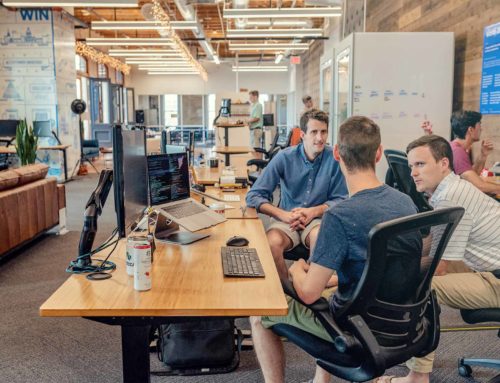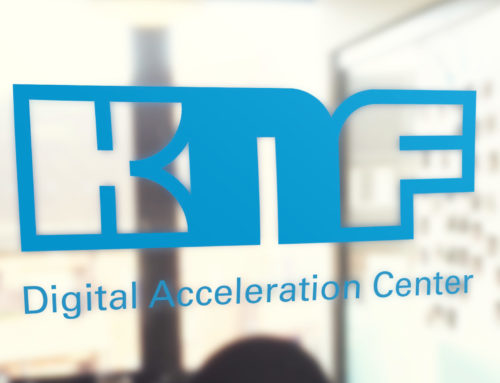Operating like a startup: How a digital mindset can be established in traditional companies
What makes a startup successful? It has the right idea at the right time. And it implements this idea in the market before anyone else does. Nowadays, 90 percent of all innovations are controlled digitally. Thus, big traditional companies have to integrate the mechanisms of startups in their culture in order to keep up with the market. Otherwise someone else would build the emission-free luxury car. This calls for a digital mindset. But where does it come from? And what is it all about?
Let’s start with the last question: “Digital mindset“ basically means that employees are familiar with digital applications and have a general digital literacy. The majority of employees – no matter in which department they work – have to understand how digital processes work and how they affect their business. Furthermore, processes need to be designed in a way that people can learn from mistakes very quickly. Continuous reflection loops and retrospectives, which are typical for startups, have to be implemented.
Let’s go on with the next question: Where does such a mindset come from? As our experience shows companies and especially development departments for human resources have to catch up. A digital mindset cannot be taught like an excel program, a language or product knowledge – it should develop just like the way it should be practiced: networked, open, participative and agile. (I have talked about the new management principles networking, openness, participation and agility – NOPA – in a previous article.)
Leadership development goes BarCamp
Good personal development is able to convey a digital mindset according to the principles of NOPA – just like I have currently witnessed in a publishing house in Hamburg, Germany. Through a BarCamp, an open and participative event, managers were enabled to understand what connected work feels like. (Whoever does not know what a BarCamp is: Here are further information.) It was fascinating to see how digital and traditional minded leaders in a long-standing company work together to create and bring on a new, digital inspired management culture.
Eight experts were part of the BarCamp – all of them are trainers and coaches from the internal management training program. Each participant got to choose workshops from four of the experts, experiencing how leadership in the digital age changes. The managers were allowed to bring in their own ideas which were integrated into the workshop. Topics like “agile management“ or “digital leadership“ – a workshop that I moderated – attracted great interest, followed by exciting discussions and talks.
Cooperation is gaining importance
The results from the workshop were interesting as well. Here are the essential results:
- Flexibility and diversity are success factors
- The ability to create processes with an open end professionally becomes a key competence
- Self-organized networks are an essential solution for challenges in the future
- Facing the dynamic and complexity of the working world hierarchical organized management increasingly fails
- Traditional competitive strategies reach their boundaries, the principle of collaboration becomes more important
- Personal coaching is a crucial tool for reflecting complex developments
- Motivation couples with self-determination and esteem more and more
This BarCamp is a great example how digital thinking about digital processes can be gradually implemented in a company – (in iterative stages, as a software designer would say). Conventional training concepts would not work in this case.
In addition to further education and BarCamps there are more ways how a digital mindset can be established in rather traditional orientated companies in order to transform a tanker to a speedboat. Or to carry a speedboat within the tanker as it is the case with most startups. This means the formation of small expert teams which focus on trending digital topics like big data analysis or e-commerce. Together with the management the HR department carefully selects employees and trains them for new tasks. After achieving success the mechanisms are expanded to the whole company. Otto is a best practice in this case – you can read about in our blog or in the special edition of the Harvard Business Manager about management in transition. This is a very effective method to digitalize big companies and cannot be established through conventional education. Accelerators (the development of digitalized products by external teams) or the so-called incubators (digital-knowledge-transfer within the company) can also work. A good example is the incubator “Hubraum” from the German Telecom or thewell-known German accelerator “Plug and Play” from Axel Springer, a digital publishing house. Instead of causing big costs for education all these concepts create benefit and enable a digital mindset within the company.
Using existing skills
By the way, dear staff developers, do you know, if there is already enough digital literacy in your company? Do you know whom of your employees is able to enhance the digital know-how of your company? Are you connected enough to use existing resources? If so, then it’s all alright. Otherwise, we recommend you to startright now: Find out about the digital literacy of your employees and use this knowledge. If this succeeds a digital mindset automatically sets in.
If you are interested in our Digital Knowledge Analysis feel free to contact Anja Hahn.







